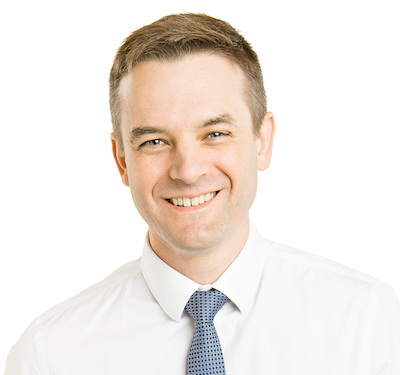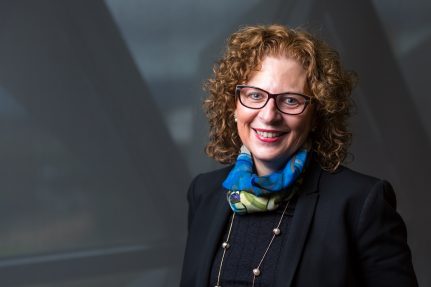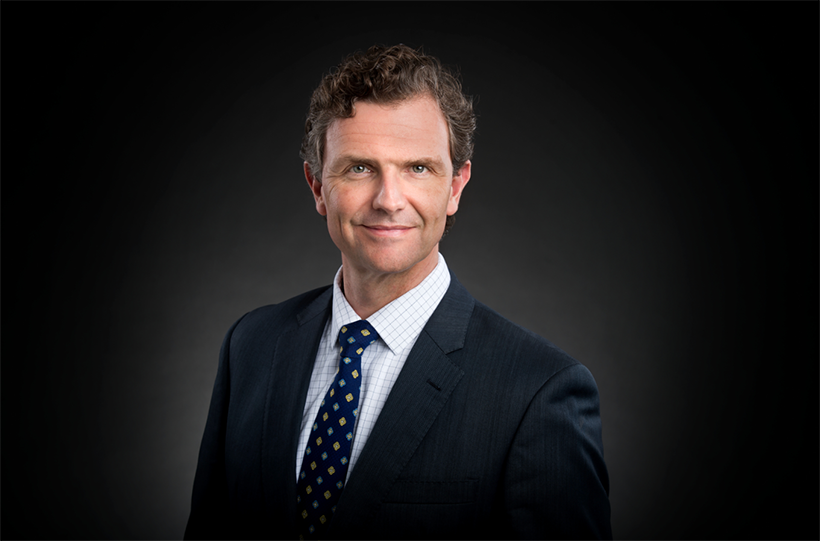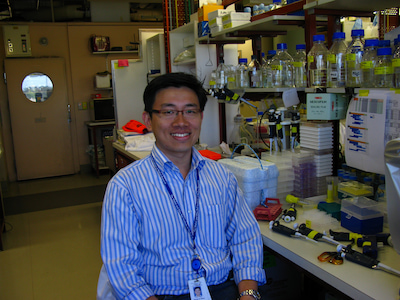Innovative new international trial for relapsed paediatric ALL opens soon
There is a great need for new treatments for children and teenagers with relapsed acute lymphoblastic leukaemia (ALL) which is why a new international study is “crucially important” says principal investigator, Dr Michael Osborn.
The Phase II RAVEN clinical trial (RAVEN), due to open in Australia in mid-2022, will give children, adolescents, and young adults (AYA) access to two new and promising drugs, not currently available for ALL here – venetoclax and navitoclax. Both drugs were largely developed in Australia by the group at the Walter and Eliza Hall Institute (WEHI) led by Professor Andrew Roberts.

RAVEN will be the first time an ALL clinical trial developed by St. Jude Children’s Research Hospital (Memphis, U.S.) will be available Australia-wide, and it is funded equally by the Leukaemia Foundation and Snowdome Foundation.
“High-quality clinical trials are vital to improve clinical care for patients diagnosed with cancer and international partnerships are essential due to the rarity of childhood cancers,” said Dr Osborn, a consultant paediatric and AYA haematologist/oncologist at the Women’s and Children’s Hospital, Adelaide.
The principal investigator for the Australia & New Zealand RAVEN Trial Team, Dr Osborn said that “while over 80% of children with ALL are cured with frontline therapy, the outlook for patients who relapse is not so good”.
“There have been a number of developments in recent years for relapsed ALL, particularly for patients with B-ALL, but the options often start to run out for those who go on to have multiple relapses,” said Dr Osborn.
“Outcomes are very poor for patients with T-ALL who relapse and patients who are resistant to some of the new immunotherapies have fairly limited options as well.”
Dr Osborn said the RAVEN study will take “quite a different approach to treating ALL, and to some of the recent immunotherapy approaches”.
The trial, designed to treat relapsed ALL patients, aged four to 21, with a combination of venetoclax, navitoclax, and chemotherapy, will recruit up to 78 patients in Australia, New Zealand, and the U.S.
“If it’s shown to be effective, it will offer potential treatments for patients who’ve run out of other options.”
Dr Osborn said RAVEN will be the first clinical trial to examine the effectiveness of venetoclax combination treatment to overcome chemotherapy resistance in children with relapsed or refractory ALL.
The recently completed Phase I study of this combination in ALL demonstrated very promising early results, highlighting the need to test the effectiveness of this combination in a larger number of children.
This small study of 12 children and 35 adults looked at the safety of combining venetoclax and navitoclax with chemotherapy for relapsed ALL, and the results suggested this approach was “probably more effective than anybody was predicting”.
“RAVEN will be the first study looking at efficacy in a large number of children with relapsed ALL,” said Dr Osborn.
“Venetoclax has been shown to be highly effective in a number of haematological malignancies in older adults, such as CLL and certain lymphomas, but in the ALL setting, there’s only really been some early Phase I studies.
“The combination of the two drugs – venetoclax and navitoclax – makes RAVEN quite unique,” he said.
“Venetoclax is being used in a number of other diseases, whereas navitoclax is earlier in its development. It’s been shown to be effective in a Phase I study together with venetoclax, but it’s not yet in broad use in other haematological malignancies.”
Dr Osborn cited a case involving one of his teenage patients, who had failed every ALL treatment.
“We were able to access venetoclax and navitoclax compassionately, and, using this combination, we were able to get this patient into a remission for the first time,” he explained.
“This experience reflects the Phase I data published last year, showing quite an impressive response rate in patients with highly resistant leukaemia who had failed everything else.”
Some elements of this study are unique compared to the initial Phase I study.
Dr Osborn said a range of genomic testing would be undertaken as part of the RAVEN study. Originally, much of that was going to be done at St. Jude but now some of the genomic work will be undertaken at the South Australian Health and Medical Research Institute (SAHMRI) in Adelaide.

“We talked with the St Jude team about the high level of proficiency that Professor Deb White’s* lab at SAHMRI had developed, and they thought it would be a great opportunity to get some of the complex laboratory testing done locally in Australia,” said Dr Osborn.
“This is an excellent opportunity for SAHMRI to be collaborating with the St. Jude group, because it will allow us to further develop our already superb diagnostic tests in partnership with one of the best ALL genomics labs in the world.”
Another unique aspect of the trial is that it incorporates some of the recent ground-breaking new immunotherapies for ALL patients who are CD19 positive, but also has an arm for patients who would not be expected to benefit from those agents.
“This is where the study really comes into its own,” said Dr Osborn.
“The new immunotherapies, including CAR T-cells, inotuzumab, and blinatumomab, rely on patients expressing specific proteins on their leukaemic cells, such as CD19.
“However, T-cell ALL patients will never be CD19 positive, and a proportion of children who relapse with B-ALL no longer have CD19 expressed on their leukaemic blast cells. The RAVEN study offers potential treatment options for these patients who otherwise would not have been able to benefit from other recently developed novel therapies.”
Dr Osborn said some patients who have the initial trial treatment and achieve a deep remission will go on to have either a stem cell transplant or CAR T-cell therapy. A smaller proportion will go on to have more prolonged chemotherapy treatment for up to two years.
“CAR T-cell therapy is only effective for B-ALL patients currently, so the only next option for T-ALL patients would be a stem cell transplant,” he said.
“We expect the majority of patients enrolled on RAVEN will ultimately either proceed to a stem cell transplant or CAR T-cells.”
ALL which has relapsed more than once is often fairly resistant to treatment.
“If patients have had a number of prior relapses, you can treat them with conventional therapy, but if they don’t achieve a deep enough remission, then stem cell transplantation won’t be feasible. It’s always really disappointing for a patient to not be able to receive a potentially curative transplant because we haven’t been able to get them into a deep enough remission to allow the transplant to work,” explained Dr Osborn.
“We hope that the venetoclax/navitoclax approach will help those patients and bring them hope where there might not have been hope previously.”
About the RAVEN study
Dr Osborn said the aim of the RAVEN clinical trial is to determine whether venetoclax and navitoclax, added to chemotherapy, will improve the rate of patients who are minimal residual disease (MRD) negative at the end of induction.
“In lay terms, it’s to see if it improves the outcomes for relapsed ALL,” he said.
Explaining how venetoclax works, Dr Osborn said, “when cancer cells are damaged by chemotherapy, they should undergo a process of cell death called apoptosis”.
“The problem is that cancer cells often become resistant to apoptosis. Venetoclax and navitoclax make cancer cells vulnerable to apoptosis again.
“Venetoclax works on one particular protein in the apoptosis pathway and navitoclax acts on other different proteins in that pathway.
“They both target the same pathway but different parts of it,” said Dr Osborn.
“One of the problems with relapsed ALL therapy is that it’s always quite intensive with most patients experiencing severe side effects. A challenge in designing this study was to not make this regimen even more toxic than previous relapse protocols.
“For instance, the RAVEN protocol has left out one of the drugs which can cause long-term complications with the heart. Hopefully there will be less long-term effects from this protocol than some previous ALL relapse protocols,” said Dr Osborn, but there is a caveat.
“A number of patients will still proceed to transplant and will be at risk of the potential late effects associated with that.”
RAVEN is due to open in Australia in mid-2022 and is expected to recruit participants over the following 30 months.
It is anticipated that the RAVEN trial will be available at Royal Children’s Hospital (VIC), Monash Children’s Hospital (VIC), Perth Children’s Hospital (WA), John Hunter Children’s Hospital (NSW), Children’s Hospital at Westmead (NSW), Sydney Children’s Hospital (NSW) and Women’s & Children’s Hospital (SA).
“In the U.S., the trial has recently been approved by the Food and Drug Administration and we’re optimistic it will be ready to start early next year,” said Dr Osborn.
“And we are certainly well on track to be able to open it soon after that in Australia.
“We are hoping to recruit up to about 25 Australians and five New Zealanders to the trial,” he said.
Most of the eight Australian paediatric oncology centres, covering all the mainland states, have expressed an interest in participating.
How RAVEN came about
RAVEN has been developed by international leaders in paediatric leukaemia research at St. Jude Children’s Research Hospital to provide access to an exciting anti-cancer agent, venetoclax, which was developed in Australia.

Dr Osborn said Dr Charles Mullighan** a co-principal investigator of the international RAVEN trial team and St. Jude Children’s Research Hospital, the international sponsor, originally reached out to the national sponsor, the Australian & New Zealand Children’s Haematology/Oncology Group (ANZCHOG). Dr Mullighan, an Australian born and trained clinician, is the Deputy Directory of the Comprehensive Cancer Centre and Co-leader of the Haematological Malignancies Program at St. Jude Children’s Hospital, and Medical Director of the St. Jude Biorepository.
“I was an intern at the Royal Adelaide Hospital in 1999 and Charles was my registrar at the time, so I’ve known him ever since doing night shift in the emergency department together,” said Dr Osborn, by way of a back story.
“In the years since, we’ve continued to be in contact, usually about difficult leukaemia cases and talking at conferences. Charles was the keynote speaker in one of our ALL conferences a few years back. So, it’s been a long friendship and collaboration and it’s really nice to see things like this trial arising from that.”

Dr Osborn said, as well, Dr Seong Lin Khaw***, from the Royal Children’s Hospital (Melbourne), was an author on the Phase I venetoclax ALL study, which was published earlier this year.
“Seong has had a longstanding interest in venetoclax and navitoclax since the time of his PhD at the Walter and Eliza Hall Institute,” said Dr Osborn.
“Together with Professor Richard Lock (Children’s Cancer Institute, Sydney), Seong conducted one of the really important early studies looking at venetoclax in mouse-models of ALL. So, it was a combination of Seong’s interest in venetoclax and the relationship with Charles Mullighan that facilitated Australia’s involvement in the RAVEN study.”
Funding of the trial
The total cost of the RAVEN trial is just over $620,000 and both the Leukaemia Foundation and Snowdome Foundation are funding this cost, 50:50.
Dr Osborn said this funding has been crucially important.
“We couldn’t have opened this study in Australia without the support of the Leukemia Foundation and Snowdome Foundation,” he said.
“So we’re immensely grateful for that, and hopeful that their funding will not only explore a really promising treatment regimen, but that it’s also helped open up international collaborations, which we hope will continue well into the future with other studies as well.”
The Australian and New Zealand Children’s Haematology/Oncology Group (ANZCHOG) is the national sponsor for RAVEN.
Dr Peter Diamond, the Leukaemia Foundation’s Head of Research, Blood Cancer Partnerships said: “RAVEN will enable immediate access to a new and promising combination treatment strategy, desperately needed for children who are not responding to treatment”.
“This is the first time we are supporting a paediatric clinical trial through ANZCHOG and we are very happy to be doing this in collaboration with the Snowdome Foundation,” said Dr Diamond.
About acute lymphoblastic leukaemia
Paediatric ALL is the most common cancer in children, accounting for about 25% of all new cancer diagnoses in children. More than 80% of children and adolescents will be cured with their frontline treatment, but up to 10-20% of them will relapse.
The outcomes of children with relapsed or refractory ALL (rALL) is poor and depends on a range of factors, including the timing of their relapse, the relapse site, and whether they have T-ALL or B-ALL. For example, until recently considerably less than half of patients who experienced a very early relapse (<18 months after diagnosis) survived. The presence of MRD after the completion of induction therapy is a strong indicator of relapse risk, which is why it is a good early indicator of whether treatment is working well or not.
Patients with rALL often experience resistance to conventional chemotherapy which limits effective treatment options. Currently rALL patients receive aggressive combination therapy, usually accompanied by stem cell transplantation. Despite therapy intensifications, most rALL patients still fail to achieve MRD negativity, an issue that is more pronounced with multiple relapses. Patients without MRD-negative remissions are more likely to experience both therapy toxicity and refractory or recurrent disease, resulting in lower survival rates.
“It is standard of care to offer patients with relapsed ALL participation on a clinical trial wherever possible,” said Dr Osborn.
“This has been how we have successfully improved survival for children with cancer over the past decades, and it will be the best way for us to continue to make improvements to benefit children with leukaemia in the future.
“We anticipate that there will be just over 10 children and young people across Australia per year who would be eligible for the RAVEN trial but hope that what we learn from this study will benefit many more.”
*Professor Deb White is a Leukaemia Foundation Strategic Ecosystem Research Partnership Grant recipient. She received funding of $250,000 (October 2019-October 2022) for her research project, Precision Medicine in ALL.
**Dr Charles Mullighan has a three-year grant (July 2019-July 2022) as part of the Leukaemia Foundation’s Translational Research Program in collaboration with the Leukemia & Lymphoma Society (U.S.) and Snowdome Foundation. The total funding of USD600,000 is co-funded by LLS ($300,000), Snowdome ($150,000), and Leukaemia Foundation ($150,000).
***Dr Seong Lin Khaw was granted a three-year PriceWaterhouseCooper Clinical Fellowship by the Leukaemia Foundation in 2009 to better understand use of a new drug, navitoclax, previously known as ABT-263 including a Phase I clinical study.
Last updated on April 13th, 2023
Developed by the Leukaemia Foundation in consultation with people living with a blood cancer, Leukaemia Foundation support staff, haematology nursing staff and/or Australian clinical haematologists. This content is provided for information purposes only and we urge you to always seek advice from a registered health care professional for diagnosis, treatment and answers to your medical questions, including the suitability of a particular therapy, service, product or treatment in your circumstances. The Leukaemia Foundation shall not bear any liability for any person relying on the materials contained on this website.